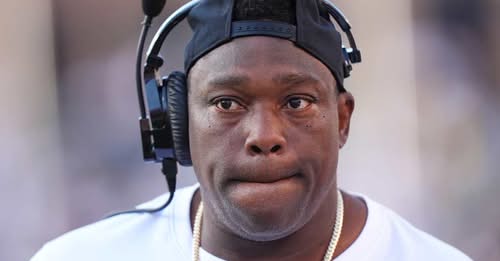Mario Cristobal, known for his intense coaching style and relentless work ethic, recently made waves when he suggested that a 100-hour work week was part of the standard for success. His statement immediately sparked debate in the college football community, with many questioning the sustainability and effectiveness of such an approach. However, one of the most vocal critics to emerge was none other than Warren Sapp, the Miami football legend, who took the opportunity to blast the Hurricanes and call out the current state of the program. His comments resonated across the football landscape, leading to a broader discussion on leadership, culture, and how Deion Sanders’ approach at Colorado starkly contrasts with Cristobal’s philosophy.
Cristobal, a Miami alum himself, took over the program with the promise of restoring it to its former glory. His blueprint was clear: discipline, structure, and an unrivaled commitment to the grind. His 100-hour work week comment was meant to showcase the dedication required to build a winning program. However, instead of inspiring confidence, it led to significant backlash. Critics, including Sapp, saw it as an outdated mindset that placed an unrealistic burden on both coaches and players.
Warren Sapp, never one to shy away from controversy, went on a scathing tirade about the state of Miami football. He lamented the program’s decline, questioning whether the coaching staff truly understood what it took to win at the highest level. In his view, Miami’s struggles were not about a lack of effort but rather a failure to adapt. Sapp’s frustration was evident, and his words carried weight given his history with the Hurricanes. He was part of the dominant Miami teams that built a legacy on talent, swagger, and an aggressive style of play. Seeing his alma mater reduced to mediocrity was something he couldn’t tolerate, and Cristobal’s statement only fueled his criticism.
Sapp’s comments added fuel to the already raging fire of doubt surrounding Cristobal’s tenure. Miami had struggled in his first season, with lackluster performances raising questions about whether his old-school approach was the right fit for modern college football. Many pointed to the program’s stagnation despite significant investments in recruiting and facilities. The 100-hour work week remark only reinforced concerns that Cristobal was prioritizing effort over innovation, grinding over strategic execution. In an era where player development and adaptability are just as important as effort, Miami seemed stuck in a cycle of outdated thinking.
Meanwhile, Deion Sanders was crafting a narrative of his own in Colorado, one that stood in stark contrast to Cristobal’s rigid structure. Sanders had taken over a struggling program and injected it with energy, confidence, and a fresh approach. Instead of emphasizing grueling work hours, he focused on creating a culture that balanced discipline with inspiration. His leadership style was rooted in empowerment rather than pure grind. He understood that today’s athletes respond differently than those of past generations. Sanders leveraged social media, personal branding, and an NFL-level understanding of the game to make Colorado one of the most intriguing programs in college football.
As Sapp blasted Miami, the juxtaposition between Cristobal and Sanders became even more apparent. While Cristobal seemed to be doubling down on the idea that outworking the competition was the key to success, Sanders was showing that connecting with players and adapting to the evolving landscape was just as critical. Sanders was proving that being relatable and leveraging modern recruiting strategies could be just as effective as old-school discipline. His ability to attract top-tier talent through the transfer portal and his innovative approach to coaching had quickly put Colorado back on the map.
For many, Sanders’ success highlighted just how outdated Miami’s approach seemed. While Cristobal preached the need for a relentless grind, Sanders was showing that winning in today’s college football world required more than just long hours. It required adaptability, charisma, and an understanding of how to motivate players in a way that resonated with their generation. The contrast couldn’t have been clearer. Miami, despite its deep-rooted history and resources, was struggling to regain relevance, while Sanders had turned Colorado into a national story in record time.
Sapp’s comments resonated beyond just Miami fans. His criticism reflected a growing sentiment that some traditional powerhouses were failing to evolve. The landscape of college football had changed dramatically with the rise of NIL deals, the transfer portal, and a more player-focused approach. Programs that adapted quickly were seeing success, while those that clung to old-school mentalities were getting left behind. Miami, once a dominant force, was now facing an identity crisis. Would they continue to embrace Cristobal’s hard-nosed philosophy, or would they recognize the need for a shift in approach?
One of the most telling aspects of this debate was the reaction from players. While some athletes appreciate structure and discipline, the reality is that the best programs today find a balance between hard work and player empowerment. Sanders understood this better than most. His ability to relate to players, market them, and put them in the best possible position for success was paying off. Players weren’t just choosing Colorado because of its facilities or history; they were choosing it because of Sanders’ vision. He was proving that leadership in modern college football was about more than just long hours—it was about creating an environment where players felt both challenged and supported.
As Miami faced criticism, the pressure on Cristobal only grew. The expectations when he arrived were sky-high, but the reality had been sobering. The Hurricanes hadn’t made the leap many expected, and with the rise of programs like Colorado under Sanders, the comparison was inevitable. The challenge for Cristobal was clear: could he adapt, or would he remain entrenched in his belief that grinding harder was the only path to success?
The fallout from Cristobal’s 100-hour work week comment was more than just a debate over coaching philosophy. It was a reflection of the larger shift happening in college football. Programs that embraced change, understood player dynamics, and leveraged modern strategies were thriving. Those that resisted were struggling. Sanders’ approach wasn’t just a gimmick—it was a calculated understanding of how to succeed in today’s game. His ability to attract top talent and build a competitive team in such a short time was a testament to his leadership.
For Miami, the road ahead was uncertain. If Cristobal continued to push his relentless work ethic without delivering tangible results, the criticism would only grow louder. Meanwhile, Sanders’ success would serve as a reminder that there was another way to build a winning program. The question Miami fans were left asking was simple: was Cristobal the right man to bring the Hurricanes back to prominence, or was his approach becoming a relic of the past?
Warren Sapp’s criticism wasn’t just about one statement. It was about the deeper issues plaguing Miami football. His frustration stemmed from watching a program he once dominated struggle to find its footing. He saw a lack of innovation, a failure to connect with the modern game, and an approach that seemed more about proving toughness than achieving actual results. And in contrast, Deion Sanders was proving that success in today’s game wasn’t just about working harder—it was about working smarter.
The debate sparked by Cristobal’s comments and Sapp’s subsequent reaction will likely continue as Miami navigates its future. The college football world is changing, and those who adapt will rise. Whether Cristobal can evolve remains to be seen, but what is clear is that the pressure is mounting. Meanwhile, Sanders continues to redefine what it means to lead a program, proving that in modern college football, charisma, adaptability, and vision are just as valuable as effort.
In the end, Warren Sapp’s blast at Miami wasn’t just about Cristobal’s work ethic—it was about the program’s unwillingness to embrace a new era. And with Sanders proving that a different approach can lead to success, Miami’s path forward remains uncertain. The Hurricanes must decide whether to continue down Cristobal’s grueling road or find a way to modernize their approach before they get left behind for good.



